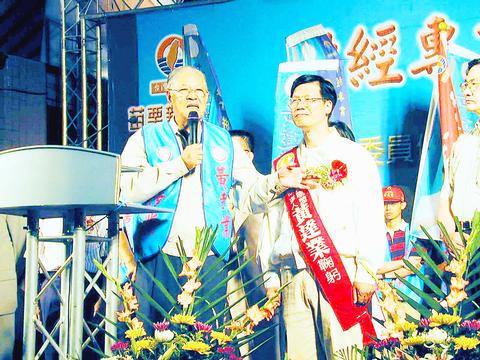Former president Lee Teng-hui (李登輝) toured the nation's Hakka region yesterday to campaign for TSU candidates, calling them professional politicians who will cease the war of words and focus on legislating if elected.
Lee dubbed these legislative-hopefuls "the top graduates from the school of Lee Teng-hui." The ex-KMT chairman said that only by sending these graduates to the legislature can his "Taiwan's first" policy be realized and the nation's political chaos ended.

PHOTO: HUNG MIN-LUNG, TAIPEI TIMES
Lee received a warm welcome during his six stops in the northwestern part of the country yesterday, with thousands of supporters shouting "President Lee, we love you" wherever he went.
The 78-year-old Lee said his hectic campaign activities have prompted concern about his health, but said "it is Taiwan, not my health, that is of great significance."
"Despite my age, my mind is very clear. I have to stand up to fight for a better future for Taiwan. I cannot sit and wait to see Taiwan engulfed by China," Lee said while attending the opening of Tzeng Ju-mei's (
Unlike previous campaign language used to lambaste rival political groups, Lee's speech yesterday was toned down, focusing more on constructive national policies, especially on how to fix the country's deteriorating economy.
"I am tired of the verbal sparring [from rival parties]; it is meaningless and I will stop making any response. What's more important is how to improve Taiwan," Lee said.
Providing the remedies to cure the nation's economic woes, the first democratically elected president said the most urgent task is to create more job opportunities and create the nation's lowest unemployment rate ever.
For instance, Lee said, the government should open industrial zones for small enterprises for free, lower the business tax and cut the interest rate of bank loans.
"Creating incentives is the only solution for the government to stop the great exodus of capital to China," Lee said.
Feeling anxiety from farmers worried that Taiwan's imminent entry to the WTO would hurt the country's agricultural sector, Lee told supporters at the rally, most of whom make a living from farm products, to put their fears to rest.
He told them that the government is well prepared for the change financially and suggested they adjust their production techniques. "Instead of relying on farming, you should shift the focus to the processing of products."
To boost to the region's stagnant economy, Lee encouraged people to take advantage of the country's geography to develop tourism, such as building up hot-spring resorts.
On the political front, Lee suggested streamlining the legislature. Lee recommended cutting the number of seats, now at 225, in half, which would save NT$25 billion for public construction.
Lee also took the opportunity to condemn a politician from the opposition camp -- Taipei City Councilor Lee Ching-yuan (
"This [form of criticism] is the most evil means of generating publicity in year-end election polls. Smart voters should not cast votes for him," Lee said.

The CIA has a message for Chinese government officials worried about their place in Chinese President Xi Jinping’s (習近平) government: Come work with us. The agency released two Mandarin-language videos on social media on Thursday inviting disgruntled officials to contact the CIA. The recruitment videos posted on YouTube and X racked up more than 5 million views combined in their first day. The outreach comes as CIA Director John Ratcliffe has vowed to boost the agency’s use of intelligence from human sources and its focus on China, which has recently targeted US officials with its own espionage operations. The videos are “aimed at

STEADFAST FRIEND: The bills encourage increased Taiwan-US engagement and address China’s distortion of UN Resolution 2758 to isolate Taiwan internationally The Presidential Office yesterday thanked the US House of Representatives for unanimously passing two Taiwan-related bills highlighting its solid support for Taiwan’s democracy and global participation, and for deepening bilateral relations. One of the bills, the Taiwan Assurance Implementation Act, requires the US Department of State to periodically review its guidelines for engagement with Taiwan, and report to the US Congress on the guidelines and plans to lift self-imposed limitations on US-Taiwan engagement. The other bill is the Taiwan International Solidarity Act, which clarifies that UN Resolution 2758 does not address the issue of the representation of Taiwan or its people in

US Indo-Pacific Commander Admiral Samuel Paparo on Friday expressed concern over the rate at which China is diversifying its military exercises, the Financial Times (FT) reported on Saturday. “The rates of change on the depth and breadth of their exercises is the one non-linear effect that I’ve seen in the last year that wakes me up at night or keeps me up at night,” Paparo was quoted by FT as saying while attending the annual Sedona Forum at the McCain Institute in Arizona. Paparo also expressed concern over the speed with which China was expanding its military. While the US

SHIFT: Taiwan’s better-than-expected first-quarter GDP and signs of weakness in the US have driven global capital back to emerging markets, the central bank head said The central bank yesterday blamed market speculation for the steep rise in the local currency, and urged exporters and financial institutions to stay calm and stop panic sell-offs to avoid hurting their own profitability. The nation’s top monetary policymaker said that it would step in, if necessary, to maintain order and stability in the foreign exchange market. The remarks came as the NT dollar yesterday closed up NT$0.919 to NT$30.145 against the US dollar in Taipei trading, after rising as high as NT$29.59 in intraday trading. The local currency has surged 5.85 percent against the greenback over the past two sessions, central